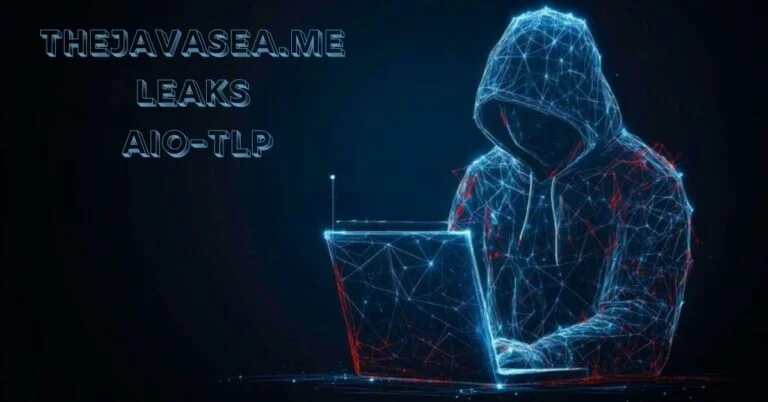Thejavasea.me Leaks AIO-TLP In the constantly evolving digital landscape, the emergence of various websites that provide unauthorized access to confidential information has raised significant concerns. One such website, thejavasea.me, has recently come under the spotlight for leaking sensitive data, known as AIO-TLP. This leak has sent shockwaves through the internet community, prompting discussions about cybersecurity, data privacy, and the ethical implications of such activities.
In this article, we will explore the intricacies of thejavasea.me, what the AIO-TLP leak entails, its potential consequences, and the broader discussion around online data leaks. We will also delve into cybersecurity measures, the legal ramifications of leaking confidential information, and the steps that organizations and individuals can take to protect themselves in the digital age.
Understanding thejavasea.me
What is thejavasea.me?
Thejavasea.me is a website that has gained notoriety for leaking confidential and often sensitive information. The site operates in the shadowy corners of the internet, sometimes known as the dark web, which is known for hosting illicit activities such as data breaches, hacking services, and illegal trade. However, thejavasea.me stands out for focusing on sharing leaked information that may include personal details, corporate secrets, or proprietary data.
The website has built a reputation among internet users who seek access to such information for various purposes. Some may use it for investigative journalism, while others may use it for more malicious intent. Either way, the presence of websites like thejavasea.me poses a significant challenge to maintaining privacy and security online.
The Emergence of AIO-TLP on thejavasea.me
The leak that brought thejavasea.me into the limelight was the AIO-TLP leak, a cache of data that contained highly sensitive information. AIO-TLP is believed to refer to a combination of datasets, including All-In-One (AIO) access and Trusted Learning Platform (TLP) files. These datasets could contain personal data, intellectual property, corporate strategies, or even government secrets.
This leak was particularly significant because it was not just another data dump but a well-coordinated release of information that included both high-level corporate documents and individual user information. This made the leak relevant to both the corporate world and the general public, sparking concerns about the implications of such breaches.
The Nature of AIO-TLP Leaks
What Exactly is AIO-TLP?
AIO-TLP stands for All-In-One Trusted Learning Platform, a data system that could include information from multiple sources or entities. This type of data is typically used by corporations, educational institutions, and sometimes government agencies for learning management, customer relationship management, or other business operations.
The AIO part suggests that this system consolidates various functions or datasets into one platform. The TLP, which typically stands for Trusted Learning Platform, signifies that this platform handles trusted and secure information. Hence, leaking AIO-TLP data implies the release of critical information that was meant to be confidential and secured by the original handlers.
The contents of such a leak can be diverse, ranging from login credentials, personal information, corporate emails, intellectual property, and even encrypted data. These leaks can cause damage to both the individuals and organizations involved, leading to financial losses, reputational harm, and legal consequences.
Why Is This Leak Important?
The AIO-TLP leak is significant for several reasons:
- Scope of Information: The leak includes a wide range of data, from personal identifiable information (PII) to business-sensitive documents. The sheer volume of information has made it a topic of global concern.
- Potential Impact: Leaked information from such a platform could be used for identity theft, corporate espionage, and fraud. Individuals and businesses affected by this leak could suffer serious financial losses and legal liabilities.
- Cybersecurity Implications: This leak raises questions about the vulnerabilities of trusted platforms and highlights the importance of robust cybersecurity measures to protect sensitive information from unauthorized access.
- Ethical Considerations: The leak has sparked debates about the ethics of leaking data. While some argue that exposing corporate or governmental wrongdoing can be justified, others point out that the collateral damage to individuals is a serious concern.
Consequences of the AIO-TLP Leak
For Individuals
For individuals whose personal information was leaked in the AIO-TLP breach, the potential consequences are severe. With their personal data exposed, individuals are at risk of identity theft, financial fraud, and other malicious activities. Hackers could use the leaked information to gain unauthorized access to bank accounts, steal identities, and perpetrate phishing scams.
Additionally, the psychological toll of having one’s personal information exposed on the internet cannot be overstated. Victims of data breaches often experience anxiety, stress, and a loss of trust in the institutions that were supposed to safeguard their data.
For Businesses
The AIO-TLP leak has also had far-reaching implications for businesses, especially those whose corporate secrets, intellectual property, and proprietary information were included in the leak. Competitors could gain access to critical business strategies, research and development plans, and customer databases, which could undermine the competitiveness of affected companies.
Moreover, businesses may face legal repercussions if it is found that they failed to implement adequate security measures to protect their customers’ and employees’ information. Data protection regulations like the General Data Protection Regulation (GDPR) in Europe and the California Consumer Privacy Act (CCPA) in the United States mandate that companies take proactive steps to secure personal data, and failure to do so can result in hefty fines.
For Governments
Government agencies could also be affected by the AIO-TLP leak, particularly if the leaked information contains classified documents, intelligence reports, or sensitive communications. The consequences of such a leak could range from diplomatic fallout to national security risks, depending on the nature of the leaked data.
Governments may also be called upon to take legal action against websites like thejavasea.me and the individuals responsible for the leak. However, given the anonymity and complexity of the dark web, bringing the perpetrators to justice can be a challenging task.
The Broader Implications of Data Leaks
The Role of Cybersecurity
The AIO-TLP leak underscores the critical importance of cybersecurity in the modern world. As businesses, governments, and individuals increasingly rely on digital platforms to store and share information, the risk of cyberattacks and data breaches continues to grow.
To mitigate these risks, organizations must invest in robust cybersecurity measures, such as encryption, multi-factor authentication, and regular security audits. Employees should also be trained on best practices for protecting sensitive information, such as recognizing phishing emails and using strong passwords.
Legal and Regulatory Challenges
The legal landscape surrounding data leaks is constantly evolving, with new regulations being introduced to address the growing threat of cybercrime. However, enforcing these regulations can be difficult, especially when the perpetrators operate in the dark web or across international borders.
In the case of the AIO-TLP leak, affected individuals and businesses may have legal recourse against the companies responsible for safeguarding their data, but holding the actual hackers accountable may prove to be a more daunting task.
Ethical Considerations
The ethics of data leaks, especially those facilitated by websites like thejavasea.me, are a subject of ongoing debate. On the one hand, some argue that exposing wrongdoing, whether by corporations or governments, can be justified if it serves the public interest. On the other hand, leaking personal information that can harm innocent individuals is seen by many as a violation of privacy and trust.
In the case of the AIO-TLP leak, the ethical implications are particularly complex. While the leak may expose corporate misdeeds or government misconduct, the harm caused to individuals whose personal information was compromised cannot be ignored.
How to Protect Yourself from Data Leaks
Best Practices for Individuals
For individuals concerned about the risk of their personal information being leaked, there are several steps they can take to protect themselves:
- Use Strong Passwords: Avoid using easily guessable passwords, and use a unique password for each online account. Consider using a password manager to generate and store strong passwords.
- Enable Two-Factor Authentication (2FA): Wherever possible, enable two-factor authentication on your online accounts to add an extra layer of security.
- Be Wary of Phishing Scams: Be cautious when clicking on links or downloading attachments in emails, especially if the sender is unknown.
- Monitor Your Credit: Regularly check your credit reports for any suspicious activity, and consider freezing your credit if you suspect your information has been compromised.
Best Practices for Businesses
For businesses, protecting sensitive information requires a comprehensive approach to cybersecurity:
- Invest in Encryption: Encrypt sensitive data both at rest and in transit to prevent unauthorized access.
- Conduct Regular Security Audits: Regularly assess your cybersecurity measures to identify and address vulnerabilities.
- Implement Access Controls: Limit access to sensitive information based on the principle of least privilege, ensuring that only authorized personnel have access to critical data.
- Train Employees: Provide regular cybersecurity training for employees to help them recognize potential threats and avoid common security mistakes.
Conclusion
The AIO-TLP leak on thejavasea.me has brought the issue of data privacy and cybersecurity to the forefront of public consciousness. The leak has not only highlighted the vulnerabilities of digital platforms but also raised important questions about the ethics of leaking sensitive information.
As we continue to navigate the complexities of the digital age, individuals, businesses, and governments must work together to enhance cybersecurity measures, protect personal information, and address the legal and ethical challenges posed by data leaks. Only by taking a proactive approach to these issues can we hope to mitigate the risks and ensure a more secure online environment for everyone.










